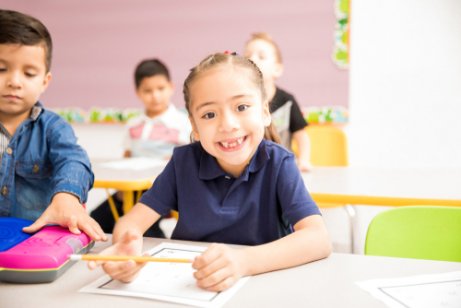The Beginning of Elementary School

Motor development in children at the beginning of elementary school
Motor development is something that changes greatly with the start of elementary school, around the ages of 5 or 6. Little ones run easily and have improved coordination. They can use their arms and legs to climb, ride a bike, etc. This indicates that they have full use of their abilities and haven’t begun the process of honing those skills. Children this age often love to take on new challenges.
One of the activities that will put your little ones to the test during elementary school is the use of instruments. At this age, children become more skilled with elements like scissors, rulers and pencils. This is because the motor control and coordination of their hands are at a very high level of development.
As children participate in sports and play games that require physical effort, they improve their abilities. This not only allows them to be more agile, but it also teaches them to work as a team.
Cognitive development during elementary school
In this particular stage, children will develop the ability to read. But not just that, they will also achieve dexterity with numbers, and mathematical problem solving.
Children learn to think logically and evaluate situations. This will lead to improved reasoning with regard to solutions. They have a better understanding of their surroundings, and also retain ideas and remember things better.
At the same time, they learn to follow orders and accept rules. They also identify dangerous situations and start to develop a sense of concern for their schoolwork.
Children develop curiosity about sexuality during this stage as well. They ask questions about their organs, where they came from, life, death, etc.
Elementary aged children become more aware about life in general. Their ability to reason is ever increasing and they can understand real situations of adult life.

Emotional changes during elementary school
Children also begin to experience emotional changes starting at this age because they begin to interact in environments that are somewhat more structured. They need to face changes regarding patterns in their lives, given that they must now fulfill certain demands of elementary education.
Teachers will assign homework that students will have to complete in order to develop their learning and sense of responsibility. Parents, in turn, must assist and supervise their children as they complete their assignments. Here, control and the ability to plan will come into play.
That emotional maturity will allow them to achieve good performance and an optimal response to demands in their future development. However, let’s not forget that they’re still children. Therefore, we need to be reasonable with demands as we guide this process.
“Education is the most powerful weapon which you can use to change the world.”
—Nelson Mandela—
Good study habits at home
During their elementary school experience, boys and girls handle a great deal of information and learning elements. Their habits need to change, because the learning environment requires they stay seated for more time.
This is the moment when they also need to develop good study habits. Their success during elementary school will greatly depend on these habits.
It’s important for parents to visualize their children’s abilities as they face this new stage and use good measure in their expectations. Establishing a routine at home will allow them to complement their children’s education at school.
These are some of the most important habits that parents can help their children establish:
Prepare a study area for your children
Just a table and a shelf are enough to keep everything your children need for their homework on hand. This area should always be available for your children so that they associate it with studying and completing homework.

Study time
Since your children are still children, they will want to play. This can make concentrating on their homework a struggle. Therefore, it’s best to get homework out of the way and then give your children time to play and relax.
Working consistently
Establishing a routing where your child feels valued and responsible will produce a feeling of security. Remember to teach the habit of fulfilling obligations, and congratulate your children when they do so successfully.
The transition of preschool to elementary school doesn’t need to be traumatic for families. All children have their own rhythm and you shouldn’t compare them.
If you manage to relax as you go through this period, you’ll be much happier. But it’s also important that you provide your children with the environment they need for good development.
Motor development in children at the beginning of elementary school
Motor development is something that changes greatly with the start of elementary school, around the ages of 5 or 6. Little ones run easily and have improved coordination. They can use their arms and legs to climb, ride a bike, etc. This indicates that they have full use of their abilities and haven’t begun the process of honing those skills. Children this age often love to take on new challenges.
One of the activities that will put your little ones to the test during elementary school is the use of instruments. At this age, children become more skilled with elements like scissors, rulers and pencils. This is because the motor control and coordination of their hands are at a very high level of development.
As children participate in sports and play games that require physical effort, they improve their abilities. This not only allows them to be more agile, but it also teaches them to work as a team.
Cognitive development during elementary school
In this particular stage, children will develop the ability to read. But not just that, they will also achieve dexterity with numbers, and mathematical problem solving.
Children learn to think logically and evaluate situations. This will lead to improved reasoning with regard to solutions. They have a better understanding of their surroundings, and also retain ideas and remember things better.
At the same time, they learn to follow orders and accept rules. They also identify dangerous situations and start to develop a sense of concern for their schoolwork.
Children develop curiosity about sexuality during this stage as well. They ask questions about their organs, where they came from, life, death, etc.
Elementary aged children become more aware about life in general. Their ability to reason is ever increasing and they can understand real situations of adult life.

Emotional changes during elementary school
Children also begin to experience emotional changes starting at this age because they begin to interact in environments that are somewhat more structured. They need to face changes regarding patterns in their lives, given that they must now fulfill certain demands of elementary education.
Teachers will assign homework that students will have to complete in order to develop their learning and sense of responsibility. Parents, in turn, must assist and supervise their children as they complete their assignments. Here, control and the ability to plan will come into play.
That emotional maturity will allow them to achieve good performance and an optimal response to demands in their future development. However, let’s not forget that they’re still children. Therefore, we need to be reasonable with demands as we guide this process.
“Education is the most powerful weapon which you can use to change the world.”
—Nelson Mandela—
Good study habits at home
During their elementary school experience, boys and girls handle a great deal of information and learning elements. Their habits need to change, because the learning environment requires they stay seated for more time.
This is the moment when they also need to develop good study habits. Their success during elementary school will greatly depend on these habits.
It’s important for parents to visualize their children’s abilities as they face this new stage and use good measure in their expectations. Establishing a routine at home will allow them to complement their children’s education at school.
These are some of the most important habits that parents can help their children establish:
Prepare a study area for your children
Just a table and a shelf are enough to keep everything your children need for their homework on hand. This area should always be available for your children so that they associate it with studying and completing homework.

Study time
Since your children are still children, they will want to play. This can make concentrating on their homework a struggle. Therefore, it’s best to get homework out of the way and then give your children time to play and relax.
Working consistently
Establishing a routing where your child feels valued and responsible will produce a feeling of security. Remember to teach the habit of fulfilling obligations, and congratulate your children when they do so successfully.
The transition of preschool to elementary school doesn’t need to be traumatic for families. All children have their own rhythm and you shouldn’t compare them.
If you manage to relax as you go through this period, you’ll be much happier. But it’s also important that you provide your children with the environment they need for good development.
This text is provided for informational purposes only and does not replace consultation with a professional. If in doubt, consult your specialist.








